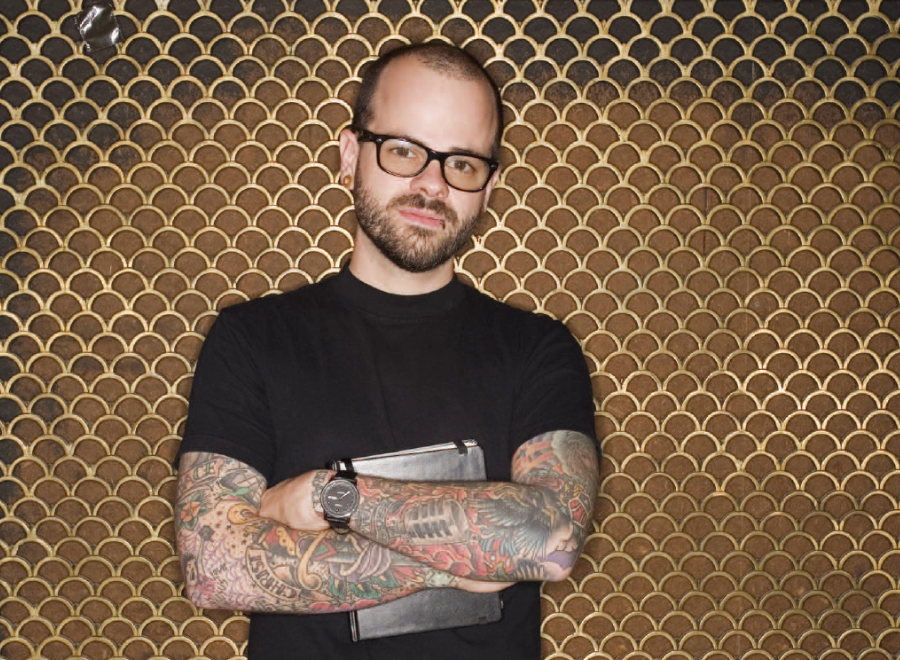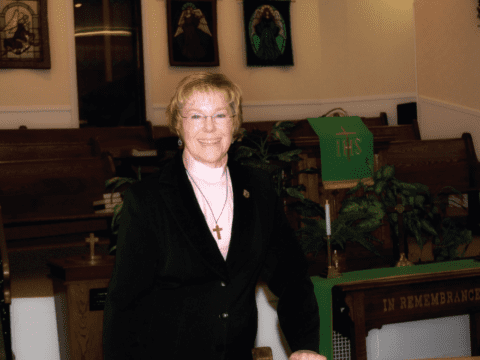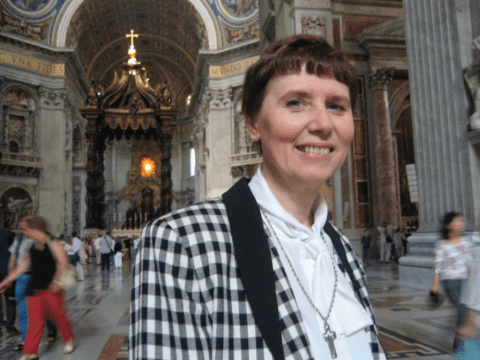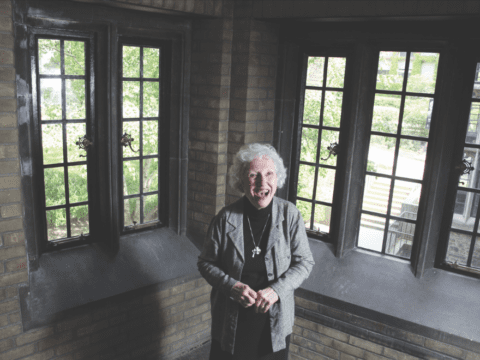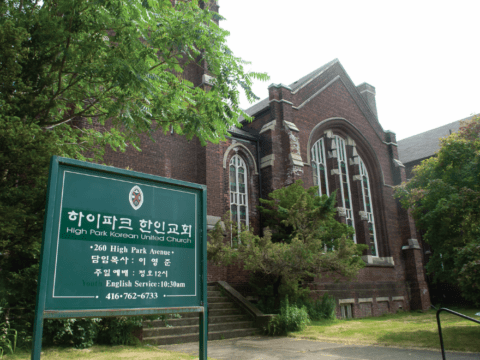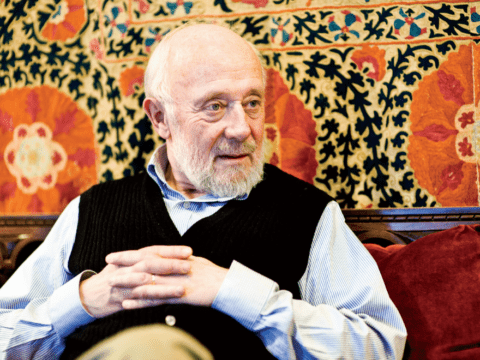Jay Bakker is cheerful and unfailingly polite, sitting inside the Blackbird Parlour, a Greek- themed cafe on the north side of Brooklyn, N.Y. Eccentric patrons sit around as little-known songs of heartache permeate the room. Tables are strewn with morsels of grilled manouri cheese and loose-leaf teas. But the 32-year-old Bakker takes a particular liking to this hodgepodge of strangeness. Bakker says moving to New York City’s fringe two years ago was one of the best decisions he has made. “Still, it’s been a challenge,” he admits. “First, I grew up in a bubble until I was about 11. Then I got so used to being in the South, where everyone knows who Jesus is. But I come out here, and you know, I might as well believe in unicorns.”
Known as Jamie Charles Bakker in Charlotte, N.C., he was exposed in adolescence to the dark underbelly of organized religion in the United States. His parents, enterprising televangelists Jim Bakker and Tammy Faye Messner, pastored what was then the largest place of worship in the country until a succession of scandals rocked their ministry. The fallout drove the young Bakker to abuse drugs and alcohol — and to stay far away from America’s premier megachurch. Today, he’s reconciled with his parents and past. He believes the experience has bettered him as a person of faith and led him to his own — albeit unorthodox — ministry today. In New York City, he is pastor of the increasingly popular Revolution Church, “a place of worship for people who have given up on church.” A self-proclaimed punk, he is challenging and, in fact helping to redefine Christianity in the United States. He is able to minister to a disillusioned subculture with earthly authenticity.
You may unsubscribe from any of our newsletters at any time.
Bakker’s own aesthetic — like his upbringing — is out of the ordinary. He sports a silver ring that protrudes through his lower lip and black discs that stretch both ear lobes. He wears a cut-off T-shirt, revealing arms that are tattooed to the wrists. Mostly, his body decorations are made up of Christian iconography: a tall ship with the words “Heaven Bound”; a sacred heart with the words, “Blameless Sinner”; and a microphone with the words “Preacher Man.” The phrase “Help me Lord” is indelibly spelled out on his knuckles. However, he’s most fond of the tattoo on his chest: a lion’s head embedded on the front of a freight train, with the words “Drive on, LaValley.” It’s a tribute to his mother, who was born Tammy Faye LaValley and died in July 2007 of colon and lung cancer.
Messner and her first husband, Jim Bakker, a former Assemblies of God minister, are most remembered for hosting The PTL (Praise the Lord) Club, the popular evangelical Christian television program that was a late-night staple in the 1980s. With as much as $1 million a week flowing in from their viewers, they built the third most successful theme park in the country, Heritage USA in Fort Mill, S.C. They had no qualms about making Jay and his sister, Tammy Sue, appear on camera as they pleaded for donations. The New Yorker’s Frances FitzGerald once wrote: “[The Bakkers] epitomized the excesses of the 1980s; the greed, the love of glitz, and the shamelessness; which in their case was so pure as to almost amount to a kind of innocence.” By the end of the decade, a sex scandal forced Jim Bakker to resign from his ministry.
Subsequent revelations of accounting fraud led to a five-year jail term. His early parole was partly the result of a massive letter-writing campaign spearheaded by Jay.
Bakker’s portrait of his father is sympathetic and, at times, even worshipful. In his 2001 book, Son of a Preacher Man, he writes: “Yes, my father did things wrong….. The real tragedy, though — the scandal — is that his ministry got too big too fast and he compromised his methods in order to keep the place running.” But the New York pastor has never felt like his father’s keeper. “Look, he’s got a lot of good qualities and some not-so-great qualities because of how he was raised,” he says. “He still struggles with things like legalism and grace after renouncing his teachings on prosperity theology. But I believe in my dad, and I think he’s a good man.”
After witnessing his father go to prison and his parents’ ostracism by the religious community, the preachers’ kid says he walked “in the shadows,” saw many “dark things” and met many “dark people.” He got depressed. He loathed himself. He partied every weekend, diving headlong into Jack Daniels, marijuana and LSD. Of that period, he says, “I never felt like I was Christian enough, so that made me give up on everything else. My self-condemnation got to the point where I couldn’t look in the mirror anymore. I just wanted to kill the pain and feel good about myself again.”
Toward the end of his teenage years, he sobered up, took a job at the Gap and re-examined his Christian faith. Bakker, along with friends Kelli Miller and Mike Walls, started Revolution Church in Phoenix in 1994. They embraced a whole subculture of people who had traditionally been ignored by U.S. churches: punks, skateboarders and street kids — the very people who embraced Bakker during his darkest days. Inside a donated house, they held services that featured bands, disc jockeys and progressive guest speakers. The trio also hosted potluck dinners and skateboard jams. It was a chance for young people to hang out and listen to a message of grace “on their own terms,” Bakker says.
In 1998, a church in Atlanta offered to help build a second Revolution Church in the city’s east end. The relationship lasted five years. Once Bakker and fellow pastors became financially independent, they moved church services to a multi-storey rock club called The Masquerade, and then to a bar called The Earl. Not long after, they created two more branches of the church in Charlotte, N.C., and New York City.
IT’S A SWELTERING SATURDAY IN AUGUST. Down at Rumblers Vintage Car Show, under the Brooklyn-Queens Expressway, Bakker marvels at all the greaser and rockabilly types with their unchecked arrogance. Men sport bowling shirts and tight jeans, while women wear tight-fitting floral dresses or tank tops with leopard-accented capris — their look inspired by bad-girl pinup models of the 1950s. Bakker admires the cars, his favourite a 1949 Ford Mercury. “Hot rods and rat rods — they are just so beautiful,” he enthuses. “There are only a few true souls out there who get it.”
Yet in some ways, Bakker remains conservative. When you’re raised in fundamentalism — in guilt — it’s hard to let go of the feeling that you have to earn God’s approval. “I believe Jesus walked the earth, was crucified and rose in three days among other things, but I don’t think the Bible is infallible,” he says. “Other ministers have their minds already made up. They don’t want to discuss other theologies. And that’s just crazy to me. Your faith isn’t alive and it doesn’t grow this way.”
“Religion kills,” Revolution Church once proclaimed. “Hey, we Christians have messed up and we’re sorry,” the church website added. “If you want to give us a second chance without the bullshit, come visit us.” While that’s not the church’s official motto, Bakker argues, “it was a good thing to say publicly at the time. It started a lot of conversation. Of course, some people just thought it was a cool thing to have printed on a T-shirt.”
In an open letter to the media, Bakker once asked, “What the hell happened to Christianity? How was Christianity co-opted by a political party? Why are Christians supporting laws that force others to live by their standards?” The answers to these questions are integral to the survival of Christianity, he believes. “People see this Made-in-America Christianity and say to themselves, Why would I want to be a part of that? They are turned off by particular Christians and eventually the religion altogether.”
Bakker’s philosophy of inclusiveness extends to gay, lesbian, bisexual and transgender people. He actively supports their right to marry. His “gay is okay” declaration came a couple of years ago. First, one of his friends came out and then a former camp counsellor. Some members of his congregation followed. “I was like, this is so strange. All these people, who have been important parts of my life, are all coming out and are either being asked to leave their church or choosing to have nothing to do with their church. And I just wasn’t sure where I stood. Then I thought, how can I condemn these people for their love of another?” Bakker started looking deeper into the Bible and attended a gay-affirming church. That’s when it all came together for him, he says.
He was accused of being a people-pleaser and taking the broad road. Some of his appearances were cancelled and a few people quit the Revolution Church in Atlanta. Says Bakker: “Gay marriage is a civil rights issue. All these people are being denied their rights. To me, the churches have so much power in that area that even liberal politicians like Barack Obama won’t say anything definitive about it. And that’s just really sad.”
IT’S SUNDAY AFTERNOON. Bakker is in the back of Pete’s Candy Store, a north Brooklyn hipster bar, where he or his co-pastor Rev. Vince Anderson preach every weekend.
Perched on a high stool, holding his leather-bound Bible, Bakker surveys the dimly lit room and adjoining hallway where about 60 people have gathered. Most are in their 20s and 30s. At times more of an emcee than a preacher, he speaks without rhetorical flourish, making references to popular culture as well as the New Testament. “There’s really no problem in trying to live out a holy life,” he proclaims to the crowd. “The problem is when you leave out compassion. When you forget to love others. Forget to care about them.”
Bakker has a mild form of dyslexia. Occasionally, he loses his way in the middle of sentences. But when he mistakes the word “emphasize” for “empathize,” he finds that Revolution Church members are usually forgiving. In fact, they seem to delight in his down-to-earth, slightly self-mocking manner.
Some attendees just want to see the prodigal son of two disgraced televangelists. But most yearn to be a part of an a Christian community free from religious dogma. When Anne Ammons first stepped foot in Pete’s Candy Store, she thought, “Well, this is way cool. It’s open and inviting, and nothing like the evangelical church I grew up in.” The 27-year-old New Yorker adds: “People aren’t used to a pastor standing up and telling everyone about their life and how they messed up. It makes people feel more at ease.”
Toward the end of his sermon, Bakker takes note of the bartender’s not-so-subtle cues. “Alright everybody, that’s it. Let’s head on out and perhaps talk a bit longer outside. It’s hot as hell in here anyway, and we’ve got to open up the doors now and let the open-mic people in.”
Later, on Pete’s back patio, Bakker takes a few long drags from a cigarette. He appears the worse for wear. Still, his spirits are high sitting in this smoky, kitschy oasis, surrounded by a mix of folks in skinny jeans and nondescript T-shirts. Overheard are sometimes-sad rock songs and the below-ground language of disaffection — precisely the thing Bakker has a chance to rail against in his come-as-you-are-whoever-you- are ministry.
There’s a small part of him that would love to be the next Billy Graham, to advise presidents. Then again, he’s seen how that kind of power can corrupt one’s vision.
“We encounter a lot of people who say, ‘Revolution Church is my last chance before I completely give up on God.’ That’s super humbling and tells me that we’re in the position to do something good here….It makes me think to myself, hey, maybe this is what the postmodern church is supposed to look like.”
***
This story first appeared in The United Church Observer’s November 2008 issue with the title “A son rises.”

